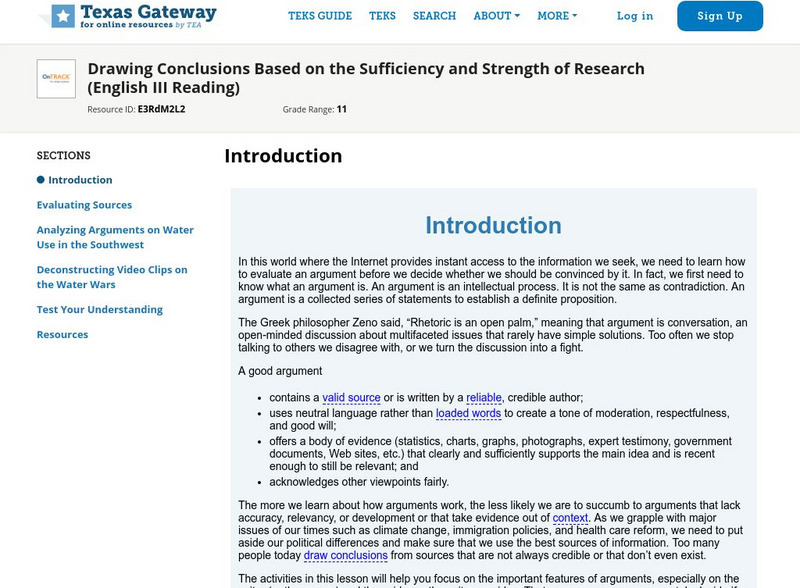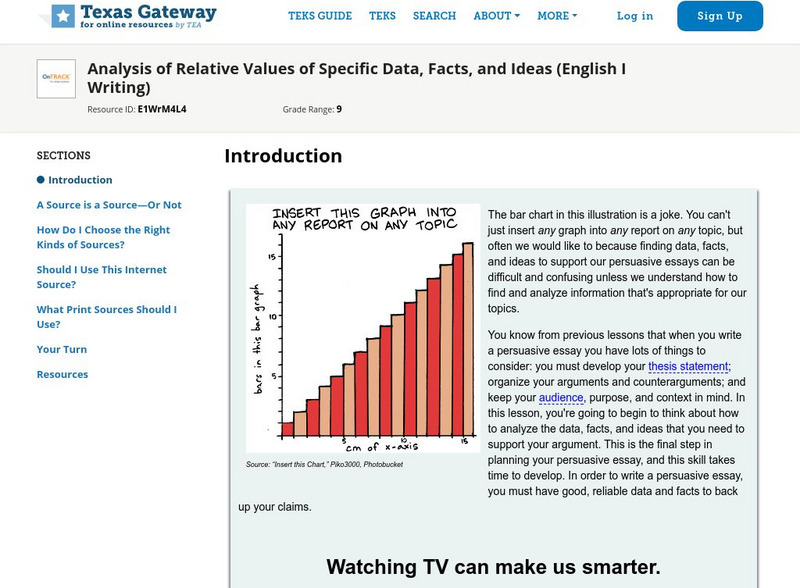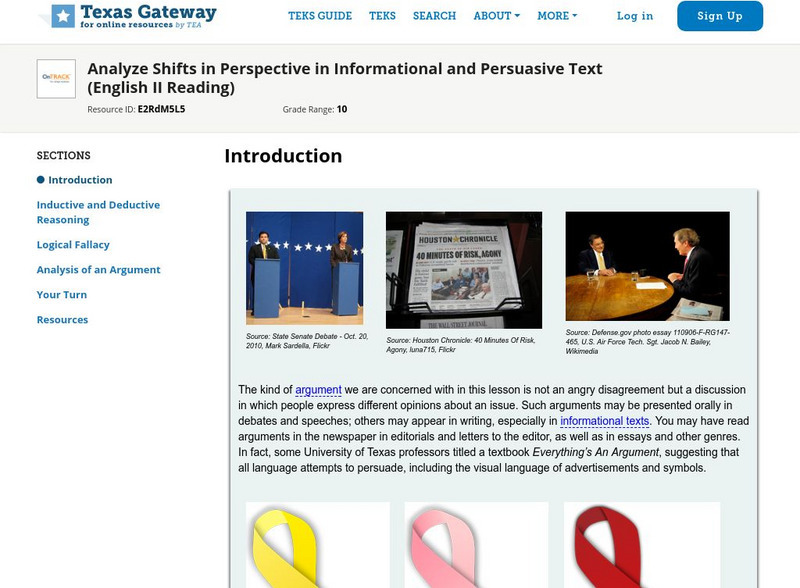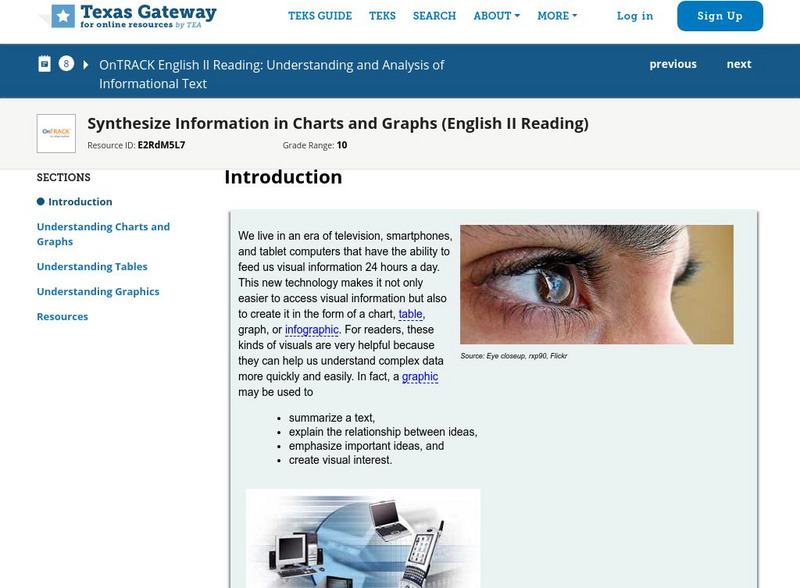Polk Brothers Foundation Center for Urban Education at DePaul University
De Paul University: Center for Urban Education: Think Clearly: Analyze Support a Position[pdf]
This Center for Urban Education resource provides a downloadable worksheet. Students will read a nonfiction article and then write about scaffolded prompts that will help them determine the strength of evidence presented in the argument.
Online Writing Lab at Purdue University
Purdue University Owl: Analyzing Your Primary Data
This entry focuses on analyzing primary data including interviews, surveys, and observations. It also warns against over-generalization and explains the advantages of the triangulation of data.
Stanford University
Stanford U.: Evaluating Information: The Cornerstone of Civic Online Reasoning
This report from the Stanford History Education Group describes the conclusions of their work in field testing a set of assessments of civic online reasoning by young people from the middle school to the college level. Middle school...
Texas Education Agency
Texas Gateway: Analysis of Relative Values of Specific Data, Facts, and Ideas
[Accessible by TX Educators. Free Registration/Login Required] In this lesson, students can practice finding specific types of sources and learn the questions to ask when evaluating information for a persuasive essay.
Texas Education Agency
Texas Gateway: Differentiate Among Empirical, Anecdotal, and Logical Evidence
[Accessible by TX Educators. Free Registration/Login Required] In this lesson, students will learn about three types of evidence that writers often rely on: logical, empirical, and anecdotal. It will also help you distinguish among these...
Texas Education Agency
Texas Gateway: Drawing Conclusions on the Sufficiency and Strength of Research
The activities in this lesson will help you focus on the important features of arguments, especially on the writer (or the source) and the evidence the writer provides. That way, you can more accurately decide if an argument is valid and...
Texas Education Agency
Texas Gateway: Analysis of Relative Values of Specific Data, Facts, and Ideas
[Accessible by TX Educators. Free Registration/Login Required] This lesson focuses on analyzing and evaluating the value of the sources used for evidence in a research project.
Texas Education Agency
Texas Gateway: Evaluating Data in Tables, Graphs and Charts
[Accessible by TX Educators. Free Registration/Login Required] In this lesson students look at examples of graphics, tables, charts, and graphs, and learn how to interpret their data. They will be able to use this skill to enhance their...
Texas Education Agency
Texas Gateway: Gathering Appropriate Information (English Iii Writing)
[Accessible by TX Educators. Free Registration/Login Required] This lesson focuses on finding and evaluating relevant sources for a research project. It includes primary and secondary sources and print and internet sources. W.11-12.2...
Texas Education Agency
Texas Gateway: Analyze the Relevance, Quality, and Credibility of Evidence
[Accessible by TX Educators. Free Registration/Login Required] In this lesson, students will learn to analyze the quality, relevance, and credibility of evidence used to support an argument.
Thinkport Education
Thinkport: Translating Qualitative & Quantitative Details: Climate Change
In this science-themed literacy lesson, students read for and differentiate between qualitative and quantitative information.
Thinkport Education
Thinkport: Citing Textual Evidence: Changing Oceans
Learn how to cite evidence to support ideas presented in a science article about oceans.
Online Writing Lab at Purdue University
Purdue University Owl: Logic in Argumentative Writing
Provides a detailed explanation of the fundamentals of logic, including brief definitions of key terms and sections on fallacies and improprieties, as well as examples and practice exercises. Click on additional subtopics in the side...
Texas Education Agency
Texas Gateway: Analyze Shifts in Perspective in Informational & Persuasive Text
[Accessible by TX Educators. Free Registration/Login Required] In this lesson, you will read informational texts and identify varying perspectives in different arguments on the same topic. You will also analyze the reasoning and the...
Texas Education Agency
Texas Gateway: Differentiate Among Empirical, Anecdotal, and Logical Evidence
[Accessible by TX Educators. Free Registration/Login Required] This lesson will help you distinguish among three kinds of evidence: logical, empirical, and anecdotal; and see how they are used to support conclusions and arguments in texts.
Arizona State University
Arizona State U.: Research Success for High School Students: Evaluating Sources
A collection of resources for evaluating sources. Topics covered include knowing your sources, assessing whether a source is scholarly, the CRAAP Test (includes chart, worksheet, and website evaluation sheet), and how to identify fake news.
University of California
University of Cal: Critical Thinking in an Online World
This article discusses why and how to encourage the development of critical thinking skills for students conducting research on the Web. The author even presents an overview of a project that you could adapt to your class.
Other
Ic You See: T Is for Thinking: Guide to Critical Thinking
This clearly presented tutorial can be used by individuals or could be presented to a class. Be sure to take the interactive quiz for some thought-provoking exercises.
Polk Brothers Foundation Center for Urban Education at DePaul University
De Paul University: Center for Urban Education: I Can Draw Conclusions: History Analysis [Pdf]
Students can use these guiding questions as they complete two graphic organizers about a historical event. Students will then ask guiding questions about the historical event to draw conclusions about the historical event.
Other
Flickr: Critical Thinking Skills Poster
A downloadable critical thinking skills poster based on the original six levels of Bloom's taxonomy.
Mind Tools
Mind Tools: Problem Solving Skills
Discover the four basic steps in problem solving: defining the problem, generating alternatives, evaluating and selecting alternatives, and implementing solutions. The first step, defining the problem, is discussed in detail. Links to...
The Write Place
Literacy Education Online: Assessing the Credibility of Online Sources
This site from the St. Cloud State University provides information on online sources. This article explains how to assess the value of online sources based on authorship, publisher, date of publication, depth of material, and...
Other
Monash University Library: Evaluating What You Find
This site explains how to evaluate the information you find in your research and provides practice exercises. It includes three sections: Evaluating the reliability of sources, Academic research on the internet, and Evaluating academic...
Texas Education Agency
Texas Gateway: Synthesize Information in Charts and Graphs (English Ii Reading)
Synthesize information that you find in charts and graphs.


![De Paul University: Center for Urban Education: Think Clearly: Analyze Support a Position[pdf] Graphic De Paul University: Center for Urban Education: Think Clearly: Analyze Support a Position[pdf] Graphic](https://d15y2dacu3jp90.cloudfront.net/images/attachment_defaults/resource/large/FPO-knovation.png)














![De Paul University: Center for Urban Education: I Can Draw Conclusions: History Analysis [Pdf] Activity De Paul University: Center for Urban Education: I Can Draw Conclusions: History Analysis [Pdf] Activity](https://content.lessonplanet.com/knovation/original/119989-9e7c5fe7337c4692a71d6981f22134f7.jpg?1661787068)



